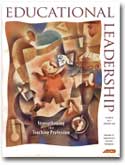Time flies by like a swallow at dusk as one grows older, and yet, when you are trying to change an institution, time seems to inch along at a turtle's pace. I am reminded of this paradox every time I talk with a new teacher. Have your education and training prepared you for your first classroom? More often than not, the new teacher answers "No." Does your school system provide professional assistance to beginning teachers? Again, the answer is usually "No."
Thirty years ago, on my first day as a teacher, I was handed a stack of books, my class roster, and told, in effect, "Go forth and teach." There was no mentoring, no peer assistance, no professional development. I can think of no other skilled professionals in America who are expected to solo from day one—not doctors, not architects, not electricians.
From Sink-or-Swim to Support
Think of all the changes that have occurred in our world over the past 30 years: Grandparents now routinely chat with their grandkids over the Internet, the Soviet Bloc has crumbled, and inflation has been tamed. But we still send ill-prepared beginners into classrooms to fly or crash on their own. The lack of structured professional assistance to beginning teachers in most school systems causes untold amounts of misery for these teachers and their students.
Is it any wonder that more than 30 percent of all new K–12 teachers quit their jobs in the first five years? Twenty percent leave after their first year. What an appalling waste of human and monetary resources this is—and what an indictment of current teacher preparation and mentoring practices.
Veteran teachers, too, face a status quo of gross professional neglect. In most districts, management's idea of professional development—the inservice workshop tacked on the end of a long teaching day—is a disservice. To make matters worse, the existing evaluation systems for teachers are at best meaningless and at worst detrimental to professional development. School administrators, who today evaluate nearly all teachers, usually have little or no training to do so.
We have been too passive for too long about our own professionalism. The teaching profession must assert itself. We must press the schools of education to develop teacher preparation programs that are both academically rigorous and steeped in practical reality. If this means five-year programs, with a full-year internship for all teacher candidates, so be it. Fortunately, some colleges and universities are now determined to reinvent teacher education and training because nothing less will do. The National Education Association (NEA) is working with seven such institutions in their reinvention efforts.
We must push for tougher state standards in granting teacher licenses. And we must take control of our own professional development. No one knows better than teachers what teachers need to become more skilled practitioners. I am encouraged that an increasing number of our local associations have become the moving force in the creation of professional development schools in their districts.
The Power of Peers
Today, most teacher contracts barely mention professional development and evaluation. There is no reason, though, why collective bargaining cannot become a powerful springboard for a comprehensive teacher quality agenda. Columbus, Ohio, is an excellent example. Under the terms of the contract between the school district and NEA's local affiliate, peer assistance and review works well. The union local designates more than two dozen outstanding educators to act as full-time consulting teachers. One of these consulting teachers is assigned to every newly hired teacher. The consultants provide intensive mentoring to newcomers, and have a major say in whether a newcomer is retained. Even more boldly, consulting teachers also intervene to assist veteran teachers who are experiencing severe difficulties in the classroom. This intensive assistance continues for an open-ended period of time, so long as the teacher is making progress. In cases in which a veteran teacher's shortcomings remain severe, however, the consulting teacher compassionately counsels him or her to leave the profession and, if necessary, recommends dismissal to a joint union-school district governing board.
This is courageous work. It forces educators out of their comfort zone. But I have never known a dedicated teacher who felt good that an incompetent colleague was working with students.
Within education today, the call for higher standards has reached a crescendo. But we must be realists. Setting higher academic standards and achieving higher academic standards are two very different things. Standards don't teach children, teachers do. The "Field of Dreams" approach to higher standards—"If we set them, the students will achieve"—is an exercise in wishful thinking. If we are serious about higher academic standards, and I hope we are, then we must empower and enable the human being at the very center of the learning process—the classroom teacher—to teach to those higher standards.
